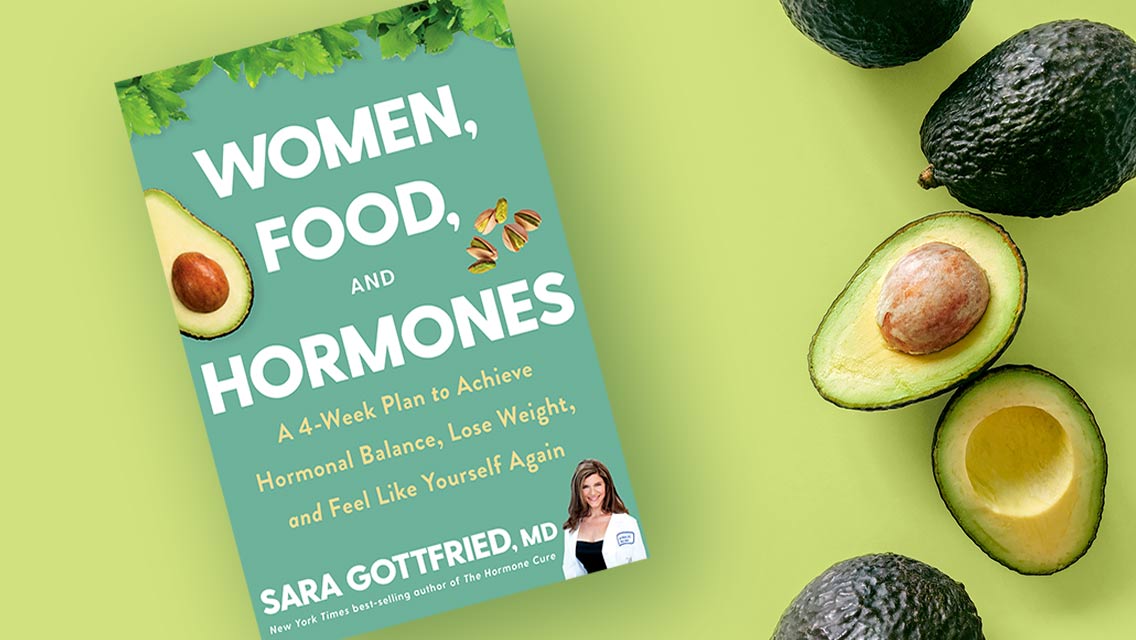I’ve been taking care of women since 1994, but over the past 10 years a large number of “keto refugees” have visited my office and participated in my online courses. I have seen up close the frustration they experience with keto, a food plan that is low in carbs, moderate in protein, and high in fat. Women tell me they gained weight on keto and ask if it’s because of the calorie-dense food plan or the generous amount of animal fat. They experience more inflammation, their joints ache, and they wonder why they don’t feel or look as great as their husbands or male coworkers who are using the same diet plan. They get stressed or start their period and come out of ketosis.
What’s up? Why does keto help most men lose weight but cause some women to gain it? We aren’t totally sure why women respond to keto differently than men do, but I can make an educated guess: It’s the hormones.
From a hormonal perspective, it’s logical that a diet low in carbs and high in fat would have a different effect on men than on women. After all, the endocrine system, and the hormones it produces, responds differently to fat, carbs, and protein, and since women and men have very different hormonal profiles, of course their bodies and hormones will react to a ketogenic diet differently.
The Science of Female Hormones and Keto
Why is this happening to so many women? What is it about female hormones that respond so differently to keto? Let’s start with Jen, a 37-year-old patient of mine with a stressful job in technology. She and her fiancé wanted to lose weight before their wedding — and Jen wanted to gain mental clarity for planning the event — so they decided to try the keto diet together. The result? Jen’s fiancé quickly lost weight: 12 pounds in the first 10 days on keto. Jen, on the other hand, gained weight almost immediately and noticed no change at all in her brain fog.
I suspected Jen’s ketogenic diet “failures” were likely due to her hormones and unresolved inflammation. To confirm this, the first thing I did was order some tests. We discovered that Jen had several issues:
- Jen had a high level of cortisol in her urine, which mirrored her concern that she was under a lot of stress. Remember that Jen was eating low-carb. Since high-quality whole-food carbohydrates like greens and multicolored vegetables can promote healthy adrenal function and stabilize cortisol levels, I suspected her diet could be exacerbating her stress.
- She had high blood sugar, in the range that indicated prediabetes. Prediabetes is common in overweight women and even in some women who are not overweight but can no longer process carbohydrates efficiently or who have become insulin resistant. High blood sugar can also cause concentration issues and a general feeling of being unwell. Jen was surprised that she could have high blood sugar while eating low-carb, but for some women, certain types of fat can actually trigger high blood sugar. Low carb doesn’t always mean lower blood sugar — saturated fat may raise blood sugar levels, perhaps because of inflammation.
- Jen’s thyroid, testosterone, and growth hormone were borderline low. I suspected this was also a function of her low-carb diet, since carbohydrates can also promote healthier thyroid and estrogen function in many women.
- Another test showed that Jen had chronic inflammation, as indicated by a high level of C-reactive protein in her blood. Sometimes this is caused by too much saturated fat in women,though the science is still evolving and suggests that lifestyle factors, such as exercise, may play a role.
This list gives you a sense of the specific ways in which a typical ketogenic diet won’t work very well for women with hormonal imbalance. Traditional keto may be too low in carbohydrates for women with a hormone imbalance, since carbs help mitigate the stress response and reduce cortisol. They also boost growth hormone and support thyroid function.
Another issue is inflammation, specifically chronic inflammation. Chronic and unresolved inflammation is nothing to mess around with as it can lead to other consequences, such as heart disease, Alzheimer’s disease, cancer, and depression. One study showed that the shift into ketosis, by which fat is burned preferentially during exercise, takes longer to kick in for women as compared to men. Men tend to burn fat more easily, and they burn it at a lower intensity than women. I believe this is because women’s bodies not only tend to need more carbs and hang on to fat for a variety of reasons (including fertility, though the problem persists and may worsen after menopause), but because women tend to have a more inflammatory response to certain fats. Because of this, their bodies resist the switch to fat burning longer than men’s bodies do. That inflammatory response from fats can also elevate blood sugar, as it seemed to have done with Jen.
So, what’s the verdict? Is keto out for Jen (and for you)? Definitely not. While classic keto may not work for most women, I’ve found that with certain workarounds specifically designed for a woman’s body and hormonal profile, keto can absolutely work for women. It’s important to remember, however, that keto may also not be healthy for people with different health issues. That’s why if you have a history of any disease, you should speak with your physician before trying keto.
For more on crafting a well-formulated keto diet for women, see Sara Gottfried’s new book, Women, Food, and Hormones: A 4-Week Plan to Achieve Hormonal Balance, Lose Weight, and Feel Like Yourself Again.





This Post Has One Comment
This doesn’t answer how a keto diet can work for women.